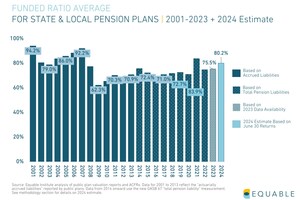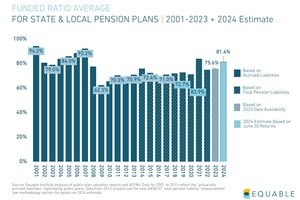Report Finds K-12 Pension Debt Costs Threaten Education Equity in Texas
NEW YORK, Jan. 31, 2023 /PRNewswire/ -- Equable Institute and Opportunity Institute have released new research exploring the effect of teacher pension debt on education resource equity in Texas.
The report, titled Pension Debt Challenges for Equity in Education: The Effect of Teacher Unfunded Liability Costs on K–12 Education Funding in Texas, found that growing unfunded pension liabilities for teachers and other school employees have silently undermined Texas' ability to improve education outcomes for students and inequitable impacts on teachers through growing costs and regressive funding mechanisms that subsidize wealthy districts.
"Texas is providing what amounts to a "subsidy" to school districts by paying virtually all of the costs for teacher retirement benefits from state resources — and the majority of that subsidy is going to the wealthier communities that can pay teachers more and retain them longer than low-wealth districts," said Anthony Randazzo, Equable executive director. "This unintended consequence of state fiscal policy is likely to be exacerbated in coming years when the contribution rates requirements for the Teachers Retirement System of Texas increase due to what is currently at least $60 billion in pension debt. It is ironic that the responsible choice to pay down the funding shortfall for TRS is at the same time expanding a pension subsidy; but the legislature can address this the next time it considers increasing teacher pension contribution rates."
Specifically, the report finds:
- An increasing share of state and local K–12 education spending has been siphoned off to cover pension costs.
- In 2020, 11.3% of Texas state expenditures on education funding ultimately went to TRS, a 41.5% increase since 2012.
- Texas retirement costs for teachers and public school employees as a share of combined state and local K–12 spending have grown 32.9% between 2012 and 2020.
- Overall education spending hasn't increased at the same rate as pension spending. This is effectively a cut to education funding that disproportionately harms low-income communities.
- State and local employer spending on TRS increased an average of 10.46 percentage points every year between 2012 and 2020, K–12 spending increased just 4.24 percentage points a year during the same time period.
- Despite the current ramp up of contributions to the Teacher Retirement System of Texas for the state, districts and teachers set to end in 2026, there will likely be a need to adjust investment assumptions and further increase contribution rates.
- Due to market forecasts, Texas will likely need to adjust their assumed rate of return below the current 7%. TRS's own analysis shows that if they used a more realistic 6% assumed rate of return, their 2022 level of unfunded liabilities is actually closer to $92.4 billion than the $59.4 billion they are currently reporting.
Opportunity Institute and Equable Institute note that without changes to how public school employee retirement benefits are financed, pension debt costs will continue to exacerbate already existing education finance inequities and draw away the resources from the students who have the greatest need.
"It is important that students in low-resourced schools have the same access to programs that can help them catch up on learning losses, while the districts serving those students are also able to attract highly qualified teachers with better compensation," said Maria Echaveste, President of the Opportunity Institute. "Improved transparency and benefit options can ensure that that current and future teachers are able to retire with dignity and lead to the improvement of equitable distribution of resources for all students."
This report is one of four reports detailing the impact of unique pension debt challenges facing state education budgets across the U.S. Please visit pensionequityineducation.org to download Texas' report along with reports for California, Florida, and Ohio.
Equable Institute and Opportunity Institute will be hosting webinars covering the findings of each of the reports in March 2023. Click here to sign up to be notified when registration opens.
The Opportunity Institute (OI) is a national education policy organization that focuses broadly on cradle-to-career education policy, practice issues, and adjacent areas of social policy. Our work bridges the domains of policy, research, advocacy, and addresses equity in three main areas of work: "Whole Child" equity; resource equity; equity indicators.
Equable is a bipartisan non-profit that works with public retirement system stakeholders to solve complex pension funding challenges with data-driven solutions. We exist to support public sector workers in understanding how their retirement systems can be improved, and to help state and local governments find ways to both fix threats to municipal finance stability and ensure the retirement security of all public servants.
SOURCE Equable Institute

WANT YOUR COMPANY'S NEWS FEATURED ON PRNEWSWIRE.COM?
Newsrooms &
Influencers
Digital Media
Outlets
Journalists
Opted In





Share this article